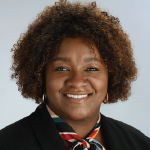Hear My Voice
 Carrie L. Francis, MD, assistant dean, student affairs, and associate professor in the department of otolaryngology–head and neck surgery, Kansas University Medical Center, Kansas City, Kan.
Carrie L. Francis, MD, assistant dean, student affairs, and associate professor in the department of otolaryngology–head and neck surgery, Kansas University Medical Center, Kansas City, Kan.
Explore This Issue
July 2020My story begins with a family that never really spoke about race—instead, we spoke about racism. My recent ancestry included domestic workers and teachers, laborers and salesmen who were able to experience class mobility and gain small increments of wealth in spite of the racism and oppression they encountered daily. Racism, as defined by Dr. Camara P. Jones, is a “system of structuring opportunity and assigning value based on the social interpretation of how one looks.” This system unfairly disadvantages some people and communities and unfairly advantages others (American Medical Association. “Prioritizing Equity: The Root Cause.” May 28, 2020. https://youtu.be/E5-5W-64Jeo). My parents were vigilant in their determination to help my brother and me understand this concept and protect us from it. They taught us to recognize racism and how to navigate our environments. We were told to evaluate others’ actions to fortify those who came after us. This served me well, and I thought I was prepared for the world of medicine.
Much changed along the journey. During medical school, race—but not racism—was discussed as the basis for disease, pathologizing my existence. There was the email, colored with racial epithets, from a student who referred to Black veterans seeking VA care as a hospital “infestation.” And I’ll never forget the surgeon who attempted to dissuade me from pursuing a surgical specialty because it would prevent me from finding a suitable “Black” mate and having a “Black” family. I remember him ending the conversation with a resigned shrug, noting that alternatives were no better since female residents’ marriages rarely survived residency anyway.
How could these experiences not impact my identity and my health? How could such actions fail to inform the future practice of my non-Black peers? Even now, examples of explicit and implicit racial bias (coded to avoid the term racism) occur far too often. Donning the white coat, scrubs, and badge has never been protective. Sitting in faculty spaces, I have been asked to collect and remove garbage. “Doctor” is often the last thing people think when they see me.
I could share more; instead, I urge you to follow Twitter’s #BlackInTheIvory, co-founded by Dr. Shardé Davis and PhD student Joy Woods. The hashtag is both a revealing and devastating glimpse of the full experience of Black trainees and academics in higher education. Among the complexity of these stories is the juxtaposition of support found in knowing that you aren’t alone and the recognition that sharing your experiences isn’t always safe. Challenging interpersonal racism can impact your reputation, job prospects, letters of recommendation, or match. Combating structural racism can come with consequence or intentional nothingness. This doesn’t even begin to address the intersection of gender and other identities.